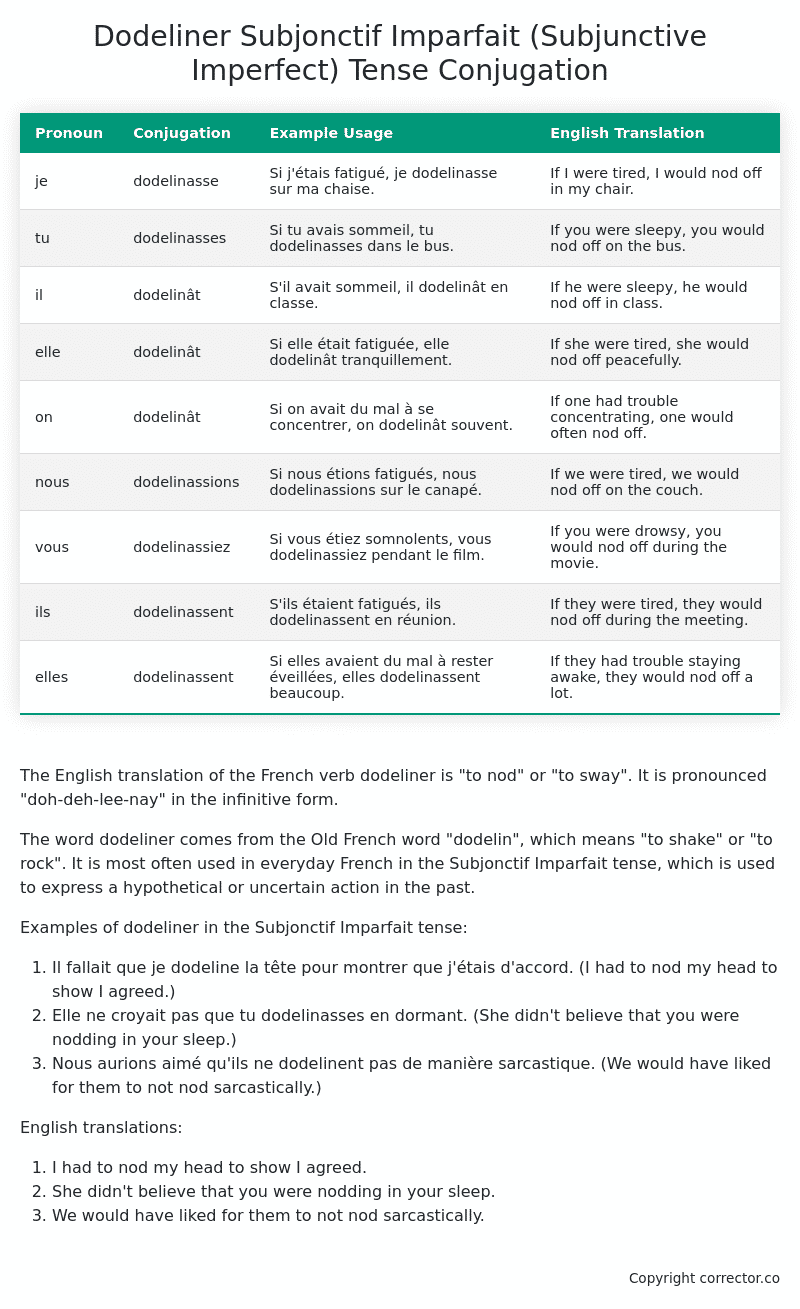Subjonctif Imparfait (Subjunctive Imperfect) Tense Conjugation of the French Verb dodeliner
Introduction to the verb dodeliner
The English translation of the French verb dodeliner is “to nod” or “to sway”. It is pronounced “doh-deh-lee-nay” in the infinitive form.
The word dodeliner comes from the Old French word “dodelin”, which means “to shake” or “to rock”. It is most often used in everyday French in the Subjonctif Imparfait tense, which is used to express a hypothetical or uncertain action in the past.
Examples of dodeliner in the Subjonctif Imparfait tense:
- Il fallait que je dodeline la tête pour montrer que j’étais d’accord. (I had to nod my head to show I agreed.)
- Elle ne croyait pas que tu dodelinasses en dormant. (She didn’t believe that you were nodding in your sleep.)
- Nous aurions aimé qu’ils ne dodelinent pas de manière sarcastique. (We would have liked for them to not nod sarcastically.)
English translations:
- I had to nod my head to show I agreed.
- She didn’t believe that you were nodding in your sleep.
- We would have liked for them to not nod sarcastically.
Table of the Subjonctif Imparfait (Subjunctive Imperfect) Tense Conjugation of dodeliner
| Pronoun | Conjugation | Example Usage | English Translation |
|---|---|---|---|
| je | dodelinasse | Si j’étais fatigué, je dodelinasse sur ma chaise. | If I were tired, I would nod off in my chair. |
| tu | dodelinasses | Si tu avais sommeil, tu dodelinasses dans le bus. | If you were sleepy, you would nod off on the bus. |
| il | dodelinât | S’il avait sommeil, il dodelinât en classe. | If he were sleepy, he would nod off in class. |
| elle | dodelinât | Si elle était fatiguée, elle dodelinât tranquillement. | If she were tired, she would nod off peacefully. |
| on | dodelinât | Si on avait du mal à se concentrer, on dodelinât souvent. | If one had trouble concentrating, one would often nod off. |
| nous | dodelinassions | Si nous étions fatigués, nous dodelinassions sur le canapé. | If we were tired, we would nod off on the couch. |
| vous | dodelinassiez | Si vous étiez somnolents, vous dodelinassiez pendant le film. | If you were drowsy, you would nod off during the movie. |
| ils | dodelinassent | S’ils étaient fatigués, ils dodelinassent en réunion. | If they were tired, they would nod off during the meeting. |
| elles | dodelinassent | Si elles avaient du mal à rester éveillées, elles dodelinassent beaucoup. | If they had trouble staying awake, they would nod off a lot. |
Other Conjugations for Dodeliner.
Le Present (Present Tense) Conjugation of the French Verb dodeliner
Imparfait (Imperfect) Tense Conjugation of the French Verb dodeliner
Passé Simple (Simple Past) Tense Conjugation of the French Verb dodeliner
Passé Composé (Present Perfect) Tense Conjugation of the French Verb dodeliner
Futur Simple (Simple Future) Tense Conjugation of the French Verb dodeliner
Futur Proche (Near Future) Tense Conjugation of the French Verb dodeliner
Plus-que-parfait (Pluperfect) Tense Conjugation of the French Verb dodeliner
Passé Antérieur (Past Anterior) Tense Conjugation of the French Verb dodeliner
Futur Antérieur (Future Anterior) Tense Conjugation of the French Verb dodeliner
Subjonctif Présent (Subjunctive Present) Tense Conjugation of the French Verb dodeliner
Subjonctif Passé (Subjunctive Past) Tense Conjugation of the French Verb dodeliner
Subjonctif Imparfait (Subjunctive Imperfect) Tense Conjugation of the French Verb dodeliner (this article)
Subjonctif Plus-que-parfait (Subjunctive Pluperfect) Tense Conjugation of the French Verb dodeliner
Conditionnel Présent (Conditional Present) Tense Conjugation of the French Verb dodeliner
Conditionnel Passé (Conditional Past) Tense Conjugation of the French Verb dodeliner
L’impératif Présent (Imperative Present) Tense Conjugation of the French Verb dodeliner
L’infinitif Présent (Infinitive Present) Tense Conjugation of the French Verb dodeliner
Struggling with French verbs or the language in general? Why not use our free French Grammar Checker – no registration required!
Get a FREE Download Study Sheet of this Conjugation 🔥
Simply right click the image below, click “save image” and get your free reference for the dodeliner Subjonctif Imparfait tense conjugation!

Dodeliner – About the French Subjonctif Imparfait (Subjunctive Imperfect) Tense
Formation
Common Everyday Usage Patterns
Interactions with Other Tenses
Subjonctif Présent
Indicatif Passé Composé
Conditional
Conditional Perfect
Summary
I hope you enjoyed this article on the verb dodeliner. Still in a learning mood? Check out another TOTALLY random French verb conjugation!


